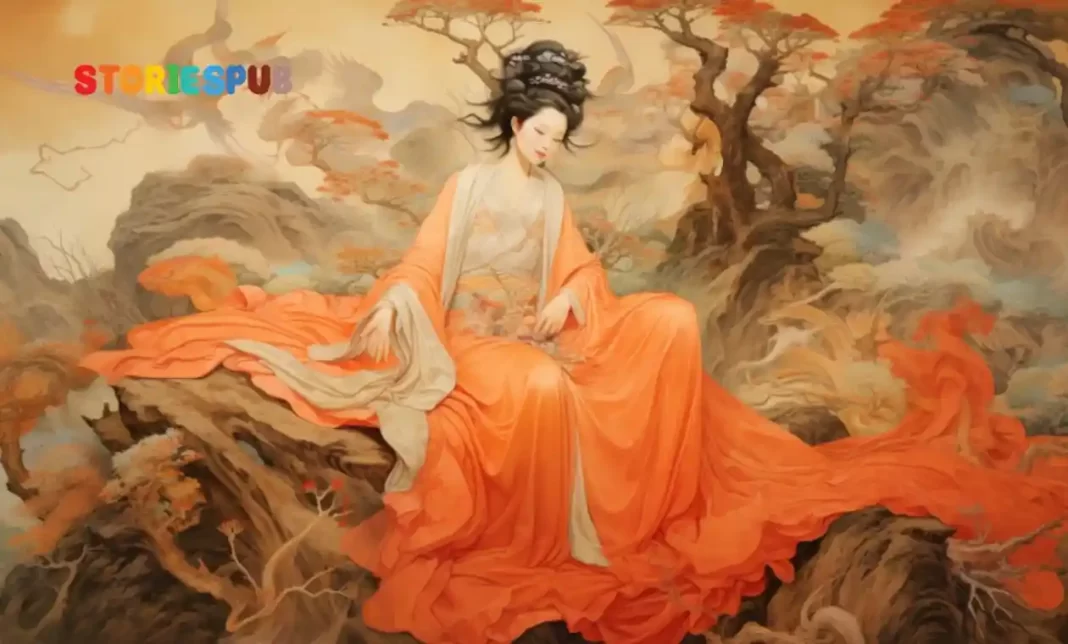Xi Wangmu: Queen Mother of the West Queen of Autumn

Introduction
Xi Wangmu, also known as the Queen Mother of the West, is a prominent figure in Chinese mythology and culture. She is often associated with autumn, and her story has been a source of inspiration for many throughout history. In this article, we will explore the complete story of Xi Wangmu, including her origins, mythology, symbolism and significance, worship and rituals as well as her legacy and influence on modern culture.
Brief Overview of Xi Wangmu
Xi Wangmu is a goddess in Chinese mythology who resides at the top of Mount Kunlun in the western region of China. She is often depicted as an elegant woman wearing colorful robes and carrying a magical peach that bestows immortality upon those who eat it.
Legends say that she rules over all female deities and governs over life’s longevity. According to Chinese mythology, Xi Wangmu has existed since ancient times.
Her precise origin is unknown; however many stories suggest that she was born from chaos at the beginning of time when the universe was created. Some tales describe her as having emerged fully-formed from a lotus flower while others suggest that she was created by combining different elements such as earth, water or fire.
Importance of Xi Wangmu in Chinese Mythology and Culture
Xi Wangmu plays an essential role in Chinese mythology and culture due to her being seen as one of the most powerful goddesses of all time. Her prominence stems from associating with concepts such as femininity power and longevity much admired by traditional Chinese society. In Taoism beliefs which originated from ancient China during the Han Dynasty (206 BCE – 220 CE), people consider Mount Kunlun to be their mystical home where they practice meditation to attain enlightenment or seek out Xi Wangmu’s blessings.
She is often revered as a protector of nature, which Chinese mythologies call the “Mother of the World.” In addition to her religious significance, Xi Wangmu has also influenced Chinese culture through books, music festivals and art; many artistic works during ancient times portrayed her as an elegant and powerful queen. Moreover, Xi Wangmu’s story has inspired many women to strive for personal power and independence in their own lives.
Her depiction as a powerful goddess who rules over all female deities has been seen as a symbol of feminine strength and leadership, inspiring countless generations of girls and women alike. As we delve further into her story in this article, we will discover how she became such a beloved figure in Chinese mythology.
Xi Wangmu is one of the most significant figures in Chinese culture due to her powerful associations with femininity power and longevity as well as her influence on literature, art and music throughout history. Her legend continues to inspire millions around the world today who look up to her for guidance on achieving personal power or seeking out spiritual enlightenment.
The Mythology and Origins of Xi Wangmu
The Legend of Xi Wangmu’s Birth
Xi Wangmu is a goddess in Chinese mythology, also known as the Queen Mother of the West. According to legend, she was born as an immortal being with a human appearance. Her parents were King Xuan Yuan and Queen Ji Ren, who ruled over the ancient land of China.
After her birth, Xi Wangmu was taken to live in the Kun Lun Mountains, where she grew up surrounded by other immortals. The story goes that as an adult, Xi Wangmu discovered a peach tree that blossomed only once every 3,000 years.
She ate one of its fruits and became immortal herself. From that point on, she became known as the Queen Mother of the West and was revered by all who knew her.
Xi Wangmu’s Role as a Goddess in Chinese Mythology
As a goddess, Xi Wangmu is associated with many roles within Chinese mythology. She is considered to be one of the most powerful deities in Chinese culture and a symbol of longevity, beauty and wisdom.
Throughout history, people have worshipped her for various reasons; some believe that she has healing powers while others think she can provide protection from harm. Her association with autumn also makes her an important figure during this season when people celebrate harvests across China.
Her Association With Autumn And The West
Xi Wangmu’s association with autumn stems from several myths linking her attributes to this season. One such story tells how she presides over trees bearing fruit or nuts during autumn which are seen as symbols for prosperity and good fortune. In addition to this symbolism surrounding autumnal themes like harvests or abundance; there is another significant aspect related to Xi Wangmu’s role-her association with “the west”.
This direction has long been considered as the place of the afterlife by ancient Chinese people, and so her domain in the west would be where souls travel after death. There are also a number of myths describing Xi Wangmu’s palace, which is said to be located in the western region of China’s Kunlun Mountains.
The palace is thought to be a place of great beauty and wonder, with jade floors and pillars made from gold. All around the palace are beautiful gardens filled with exotic flowers and fruit trees
Xi Wangmu represents an important figure in Chinese mythology, embodying an array of qualities including wisdom, beauty, longevity and strength. Her association with autumn and western direction makes her also a symbol for hope during difficult times or as representation for life’s journey beyond this realm.
Symbolism and Significance
The Peach Tree Garden and Immortality
In Chinese mythology, the peach is often associated with immortality. It is said that Xi Wangmu’s palace is located in the “Peach Blossom Land,” where peach trees bloom all year round, and immortality can be achieved by eating the peaches grown there. The significance of this garden lies not only in its promise of eternal life, but also in its representation of a utopia – a perfect world that exists beyond human reach.
According to legend, Xi Wangmu served her guests with peaches that granted immortality. One such guest was the famous Chinese scholar and philosopher, Lao Tzu.
In Taoist tradition, Lao Tzu is said to have written the Tao Te Ching after being inspired by his encounter with Xi Wangmu and her peaches. The story reflects the idea that knowledge and wisdom are essential for achieving immortality – both physical and spiritual.
The Connection between Xi Wangmu and Taoism
Xi Wangmu’s association with Taoism goes beyond her connection to Lao Tzu. In fact, she herself is considered one of the “Eight Immortals” in Taoist mythology – a group of legendary saints who attained immortality through their mastery of alchemy, meditation, or martial arts.
As an immortal goddess who rules over the western region where the sun sets, Xi Wangmu has been interpreted as a symbol of yin – feminine energy associated with darkness, mystery, and creativity. This symbolism aligns with many Taoist principles that emphasize balance between yin and yang (masculine energy associated with lightness) as necessary for achieving harmony in life.
Her Role as a Symbol of Feminine Power
As one of China’s most revered goddesses, Xi Wangmu embodies many qualities associated with feminine power. She is often portrayed as an ethereal beauty with long hair and flowing robes, surrounded by attendants who serve her every need.
In addition to her physical beauty, Xi Wangmu is also known for her wisdom and intelligence. She is said to possess the “elixir of life” – a powerful substance that grants immortality – which has made her a symbol of knowledge and enlightenment.
Furthermore, Xi Wangmu’s association with autumn suggests that she represents a season of change and transformation. This symbolism reflects the idea that women have the power to create new life through childbirth, as well as the ability to adapt and thrive in changing circumstances.
In Chinese culture, Xi Wangmu has come to represent not only femininity but also leadership and authority. As the Queen Mother of the West, she holds a high position in mythology and has influenced many aspects of Chinese culture throughout history.
Worship and Rituals
Temples dedicated to Xi Wangmu in China
Xi Wangmu is one of the most revered goddesses in Chinese mythology, and her importance is reflected in the number of temples and shrines dedicated to her throughout China. One of the most famous sites is the Temple of the Queen Mother of the West, located on Mount Zhongnan in Shaanxi province.
This temple has a history that dates back over 2,000 years and is said to be the place where Xi Wangmu lived. Another major temple dedicated to Xi Wangmu is located in Chengdu, Sichuan province.
It was built during the Tang dynasty (618-907) and features a statue of Xi Wangmu made from pure gold. Other notable temples include those found on Mount Emei in Sichuan, Mount Tai in Shandong province, and Mount Hua in Shaanxi province.
Offerings made to her during rituals and festivals
Many rituals and festivals are held throughout China each year to honor Xi Wangmu. These celebrations typically involve offerings of food, incense, candles, and other gifts left at temples or shrines dedicated to her. The most important festival devoted to Xi Wangmu takes place on the ninth day of the ninth lunar month (usually around early October), which is considered her birthday.
During this festival, people climb mountains or hills as a way of reaching “the abode of immortals” where it was believed that she resided. Participants also offer peaches which symbolize longevity as well as other gifts such as flowers or fruit.
The significance of her presence in traditional Chinese art
Xi Wangmu’s importance can also be seen through her frequent appearance in traditional Chinese art. She is often depicted as an elegant woman dressed in flowing robes and surrounded by peaches, cranes, and other symbols of immortality. Her image can be found on everything from porcelain plates and vases to scrolls and murals.
Some of the most famous works of art featuring Xi Wangmu include the murals in the Mogao caves near Dunhuang, which date back to the Tang dynasty. These paintings depict her as a regal figure surrounded by attendants and flanked by dragons.
Xi Wangmu’s influence can be seen not only in Chinese mythology but also in the country’s religious practices, festivals, and art. Her legacy continues to inspire people today as a symbol of feminine power, longevity, and immortality.
Legacy and Influence
The impact of Xi Wangmu on modern culture, including literature, film, music, and fashion.
Xi Wangmu’s influence can be seen in various forms of modern art and culture. From literature to films, her story has been retold in different ways.
One such example is in the novel “The Incarnations” by Susan Barker. The book tells the story of a taxi driver who is haunted by visions of Xi Wangmu and other historical figures from Chinese history.
In the film “Crouching Tiger, Hidden Dragon,” Xi Wangmu’s image is referenced as a symbol of female empowerment. In music, Xi Wangmu’s influence can be seen in songs that reference her name or tell her story.
One such song is “Queen Mother” by musician Melissa Laveaux. The song tells the story of how Xi Wangmu became a goddess and her role as a powerful figure in Chinese mythology.
In fashion, Xi Wangmu’s influence can be seen in designer collections that incorporate elements from traditional Chinese attire. Her image has also been used as inspiration for various accessories like earrings and pendants.
How her legacy has been preserved through the centuries.
Xi Wangmu’s legacy has been preserved through various means over the centuries. Temples dedicated to her have been built across China since ancient times.
These temples are still visited by pilgrims today who seek blessings from the goddess. Her story has also been passed down through generations via oral tradition and written texts like poems and books.
Many scholars have written about Xi Wangmu throughout history recording different versions of her myths. Her influence can also be seen in traditional Chinese art forms like painting, sculpture, embroidery etc., where she is depicted as an elegant goddess with mythical creatures surrounding her.
The continued relevance of her story today
Symbol of Feminine Power
Xi Wangmu’s story continues to be relevant today because of her portrayal as a symbol of feminine power. Her character is often associated with qualities like strength, independence, and wisdom. In modern times when gender equality is a topic of importance, her story serves as an inspiration to women around the world.
Celebrated in Festivals
Xi Wangmu continues to be celebrated in various festivals across China. One such festival is the Peach Blossom Festival that takes place every year in March. The festival celebrates Xi Wangmu and includes offerings of peaches and other fruits that are believed to bring good luck.
Inspiration for Spiritual Growth
Many people view Xi Wangmu’s story as an allegory for spiritual growth. Her journey from a mortal woman to an immortal goddess represents transcendence from the earthly plane towards enlightenment. People who seek spiritual growth often look towards her story for guidance and inspiration.
Xi Wangmu’s legacy has endured through the centuries due to her representation as a powerful female figure and allegory for spiritual growth. Her influence can be seen in various forms of modern art today which shows how relevant her story still remains.
Conclusion
Summation of the Importance of Xi Wangmu in Chinese Mythology
Xi Wangmu’s story may seem like just another mythological tale, but it holds an important place in Chinese culture and history. Her association with autumn and the west reflects the importance of balance and harmony between opposing forces. Additionally, her role as a goddess of immortality and feminine power serves to inspire women to embrace their strength and potential.
Throughout centuries, she has been revered as a symbol of hope for those seeking longevity, prosperity, and wisdom. Her presence in traditional Chinese art is a testament to her enduring legacy.
Reflection on How Her Story Can Inspire Us Today
The story of Xi Wangmu carries important lessons that resonate even today. Her commitment to balance, harmony, and self-assurance underscores the importance of embracing our individual strengths while acknowledging our shortcomings. She reminds us that we all have unique gifts that can create positive change in our lives and communities.
Her story also teaches us to value life’s simple pleasures. Through her peach tree garden – a symbol for immortality – we learn to appreciate the beauty around us and cherish each moment we have with loved ones.
Above all else, Xi Wangmu inspires us to believe in ourselves. We must learn to trust our own intuition and power within ourselves to overcome obstacles that may arise in life.
Final Thoughts on the Enduring Legacy of Xi Wangmu
Xi Wangmu’s story has endured through centuries because it speaks not only to ancient China but also resonates universally across cultures today. Her legacy has been preserved through literature, film, music, fashion, art exhibitions among others which demonstrate how her enduring influence continues inspiring people across ages.
As we move forward into an uncertain future filled with new challenges as well as opportunities towards growth- let’s take cues from Xi Wangmu’s story and strive to achieve a balance between different aspects of our lives. Let’s celebrate the feminine power and trust in our own abilities.
Xi Wangmu’s story is one that will continue to inspire and enlighten for many generations to come. May it remind us always of the importance of balance, harmony, and self-acceptance as we navigate through our own unique journeys in life.
Hey kids, how much did you like Xi Wangmu: Queen Mother of the West Queen of Autumn? Please share your view in the comment box. Also, please share this story with your friends on social media so they can also enjoy it, and for more such Chinese Mythology, please bookmark storiespub.com.
Related Post :
























